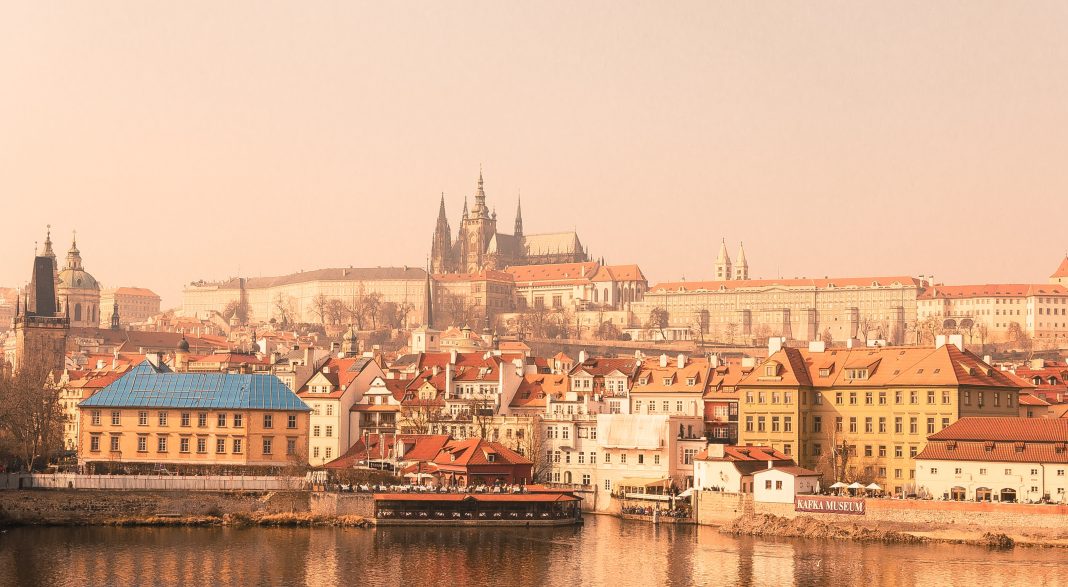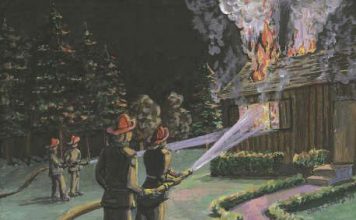 |
|
| Issue #90 • November/December, 2004 |
He was in the other office when I heard his voice. But he was getting closer and closer and then he came through the door into the editorial offices.
“Hey,” he said when he spotted me.
“Mac,” I said, surprised he was there.
Mac, of course, is O.E. MacDougal, our poker-playing friend from southern California.
We exchanged pleasantries and I asked, “What are you doing here?”
“I’m on my way up north to meet some friends I’m going fishing with. Anything happening here?”
“Nope,” I said and just as quickly added, “But there is one thing, a few readers wrote in with a criticism of some of the things I’ve written.”
He eyed me expectantly.
“The gist of it is they say we bandy the word democracy around a little too freely. They said the United States isn’t a democracy, it’s a republic and that nowhere in the Constitution is it said we’re a democracy.”
“But nowhere does it say that the United States is a republic, either” he said.
“Sure it does, in Article IV, Section 4, it does.”
“If I’m not mistaken,” Mac said, “that’s the only place a form of the word republic appears and what it says is that the states are guaranteed the right to have a republican form of government.”
“And…?”
“It doesn’t say the United States will be a republic. Just that the states can be republics if that’s what they want. So, I’d have to conclude that if we use the argument that the fact the Constitution doesn’t specify a democracy means that were not meant to be a democracy, then I could use the argument that since it also doesn’t specify we were to be a republic, the United States is not meant to be a republic, either.”
I didn’t say anything. I didn’t know what to say.
“I’m not trying to be difficult,” Mac said, “because the fact is that the Founding Fathers set the United States up with all the trappings of being a republic, and they intended it to be one. But it also goes to say that we can divine from the Founders own words that they meant for those in the House to be elected, so we’re a democratic republic, while those in the Senate were to be appointed by the various state legislatures. Thomas Jefferson referred to himself as a democratic republican. What do you think he was referring to there?”
“Wait a minute, Mac, the senators are elected, too,” I said.
“Not originally. The House was meant to represent the will of the people and was to be elected directly, while the Senate was supposed to represent the interests of the states and also to act as a stabilizing influence in our federal form of government.”
“What do you mean by stabilizing?” I asked.
“In light of the fact that the House was elected directly, and because the Founding Fathers saw the problems that had befallen the democracy that had existed in ancient Athens, they wanted a house that was removed from the direct vote of the masses and might be less influenced by fad and impulse.”
“One more thing I want to ask you,” I said. “What does that phrase you used, ‘federal form of government’ mean?”
“A federal form of government means that the political units that make it up, in this case the individual states, have agreed to give up certain powers, as per the Constitution, while they reserve other powers for the states themselvesor, as our 10th Amendment says, to the states or to the people.”
“They were that much afraid of centralized power,” I said.
“Yes.”
“But it seems as though the federal government keeps gobbling up more and more power.”
He just raised his eyebrows and smiled.
“When did the Senate come to be elected by popular vote?” I asked.
“It was an amendment to the Constitution in 1916.”
“So, what is the real difference between a republic and a democracy?” I asked.
He thought. “Let’s talk about republics,” he said. There are various types, today. Some are elected, some are military dictatorships. But in the classical form a republic is a form of government that attempts to mix the best elements of the classes of society together. Originally there was the Spartan model which was a tri-political government of kings, the gerousiaor aristocracy, and the Ephorsthe democratic body.
“Another of the world’s first republic was early Rome’s. It was a blend of democracy of the people, the aristocracy which formed the Senate, and the consuls who were the executive officers who had replaced the kings.”
“So the first republics were, in part, democratically elected,” I said.
“That’s right. They also had a written constitution that marked out the duties and responsibilities of the different bodies. The Romans intended to include all citizens in government and their constitution provided checks and balances on all the classes in the hope that everyone would live together harmoniously without any one of the classes being dominant.”
“Well, after reading my Last Word column on democracy in Iraq, one guy wrote in and said what the Iraqis need isn’t a democracy, but a republican form of government.”
“I don’t know why anyone thinks a republic is a cure-all for anything. Iraq under Hussein was a republic. So was the old Soviet Union. So what kind of a republic do you want? A military dictatorship? Communist dictatorship? One where the representatives are elected? Or even the one envisioned by Plato.
“Plato’s Republic is about a state run by experts, so-called philosopher kings. Frankly, though I love reading the Socratic dialogues Plato wrote, his form of republic strikes me as a nightmare to live in. It sounds like the kind of republic today’s liberal academia would choose for us: Namely, government by those who know what’s good for us with penalties if you disagree.
“By the way, in theory, the government of the United Kingdom more closely resembles the original republican government of Sparta, in that it has a monarchy, a governing house that is the aristocracythat’s the House of Lords, and a house elected democratically and represents the common man. That last one is, of course, the House of Commons.
“But, in reality, the British Royal Family has no power nowadays, the House of Lords is, for all intents and purposes, impotent. The real head of state is the Prime Minister, a member of the House of Commons, who is elected by its members and real power in the government resides in the Commons.”
“So, in structure, it’s a classical republic,” Dave said, “but we call it…?”
I didn’t know Dave was even listening to us.
“We call countries like the United Kingdom constitutional monarchies,” Mac replied.
“But doesn’t that mean we’re not a republic in the classical sense?” Dave asked. I mean, we have never had a formally aristocratic class.”
“That’s right,” Mac said. “It’s because the word ‘republic’ has come to describe quite a few governments that don’t seem to have much in common.”
“What about democracies?” Dave asked.
Mac thought a moment. “There’s also a problem with what we mean by democracy. The first democracy was the pure or direct democracy of ancient Athens. There, the decisions of state were not made by legislative bodies or kings but en masse, by those who could vote. All those eligible to vote would meet in the agora and decide the issues of the day. Even trials were conducted with juries that often included several hundred jurors.
“What’s an agora?” I asked.
“A gathering placeespecially the marketplacein ancient Greece.
“But even in Athens’ pure democracy not everyone could vote. Children, of course, couldn’t. Neither could women. Nor slaves. Nor could noncitizens. You couldn’t emigrate to Athens and become a naturalized citizen, then vote, as we can in the modern United States. What it amounted to was something less than 10 percent of the population of Athens was allowed to vote.
“And, strictly speaking, even in ancient Athens certain posts, such as those that required financial skills were appointed. No one wanted to trust the masses with that.
“Are there any true democracies along the lines of what the Athenians meant by democracy,” Dave asked.
“No. In fact, that may be the only time and place in history that a democracy like that ever ever existed. Today, when we use the word democracy, almost no one means a Athenian-type of democracy. We generally mean we are voting for representatives.”
“But that’s sounds like a republican form of government,” Dave said.
“Yes, and nowadays that’s usually how it’s used.”
“Hey, listen to this, Mac,” I said. “Someone sent me a letter that said, ‘A Democracy is three wolves and a sheep voting on dinner,'” I said. “How do you feel about that?”
“I’ve seen that quote,” he said. “And that’s how the democracy of ancient Athens was able to order Socrates to commit suicide by drinking hemlock. There was no constitution, nor was there the concept of natural or God-given rights.
“But along the lines of that quote there are some other good quotes. One describes a republic as the same wolves and sheep but says, ‘In a republic the flock gets to vote for which wolves vote on dinner.'”
Dave said, “It sounds as though in that definition, the wolves are the representatives and if they vote wrong, they get voted out.”
“That’s right,” Mac said. “Then,” he added, “there’s a constitutional republic. In a constitutional republic voting on dinner is expressly forbidden, and the sheep are armed.”
“In that analogy,” Dave said, “there’s a constitution that dictates what the government is allowed to do, what’s it’s prohibited from, and there’s also something equivalent to our Second Amendment.”
“You hit the nail on the head,” Mac said.
I said, “Here’s another one someone sent to me. It reads: ‘Fifty-one percent of a nation can establish a totalitarian regime, suppress minorities, and still remain democratic.’ It’s a quote by someone named Erik von Kuehnelt-Leddihn. How do you feel about that?”
“That’s how the Athenians’ pure democracy and that’s how they got to order Socrates to drink hemlock.”
“Which form of government is best?” I asked.
“The best one is the republic the Founding Fathers intended us to have. But here’s the thing: Anyone who thinks a democratic form of government, a republican form, a constitution, or anything else is going to save this or any other country is in for a rude surprise. The only thing that can save a people and their country are the people themselves.”
“Sort of like ‘God helps those who help themselves,'” Dave opined.
“Sure. If the American people think. ‘Gee, if we just get this law passed and the Constitution followed we can all go home and watch more TV,’ they’re deluding themselves. The saying that ‘Eternal vigilance is the price of liberty,’ is no exaggeration”
“Who said that?” I asked.
“Wendell Phillips, a 19th century abolitionist.
“We have a government that was set up for the benefit of the individual, but it’s not going to stay that way unless the people protect it and insist it stays intact. The trouble is, today only a handful of people seem to feel that way and their voices are getting lost in the crowd.
“If you want to hear a nice quote it’s by Daniel Webster. He said, ‘God grants liberty only to those who love it, and are always ready to guard and defend it.’ And I don’t see us doing that today.”
“How are we suppose to do it?” Dave asked.
“We’ve talked about this, before. It was part of The Coming American Dictatorship John wrote. But here’s a start: I’ve said a smarter electorate would be a good first step. Not more voters, but more thoughtful and better informed voters. One of the things the Founding Fathers did was to make a qualification for voting. They wanted responsible voters and what they settled on was that you had to be a property holder. I’m an advocate of responsible voters. My criteria would be that ballots would be blank, other than designations for offices to be filled or propositions that appear. But there would be no names. That way, you can only vote if you know what’s going on. It’s not a cure-all, but it would be a start.”
“That’s not going to happen,” Dave said.
“I know,” Mac said so quickly that Dave and I laughed.
“Well, many of your and my critics are still going to say that when we say we’re a democracy we’re wrong.”
“I’ll admit that I’m guilty of using the word democracy in the popular sense. But English is a living language and like so many other words it’s has taken on more than one meaning, the latest being that of republic.”
“What do you mean by ‘living language’?” I asked.
“It’s always changing. Most people don’t have a clue as to what the ancient Athenian democracy was, and when they use the word ‘democracy’ they’re talking about voting for their legislatures, governors, mayors, and what have you, not direct representation. Except…”
“Except what?” Dave asked.
“Too many also think that if 51 percent of the people don’t want someone having their say or owning a gun or exercising any other of our rights, that those rights can just be abrogated.”
“I think that’s what a lot of your critics are afraid of when they say you use the word democracy indiscriminately,” I said.
“Okay,” Mac said. “Then I’ll be more careful in the future.
“But I don’t know anyone today who’s advocating a pure democracy,” he added. “Not even the Democratic Party, which bandies the world ‘democracy’ about more than anyone. You know they don’t mean a pure democracy because a pure democracy would put them out of business. In fact, what they seem to want, and what the neoconservative branch of the Republican Party seems to want today is a government of experts such as Plato envisioned in his Republic.”
Dave and I thought long about that one.
Finally, Dave leaned forward and said, “Hey, do you want to practice some fishing before you go up north?”
“Like Oprah wants another donut,” he said.
“Get your pole, Silveira.”
“I’m on my way,” I responded, and we took the rest of the day off.














